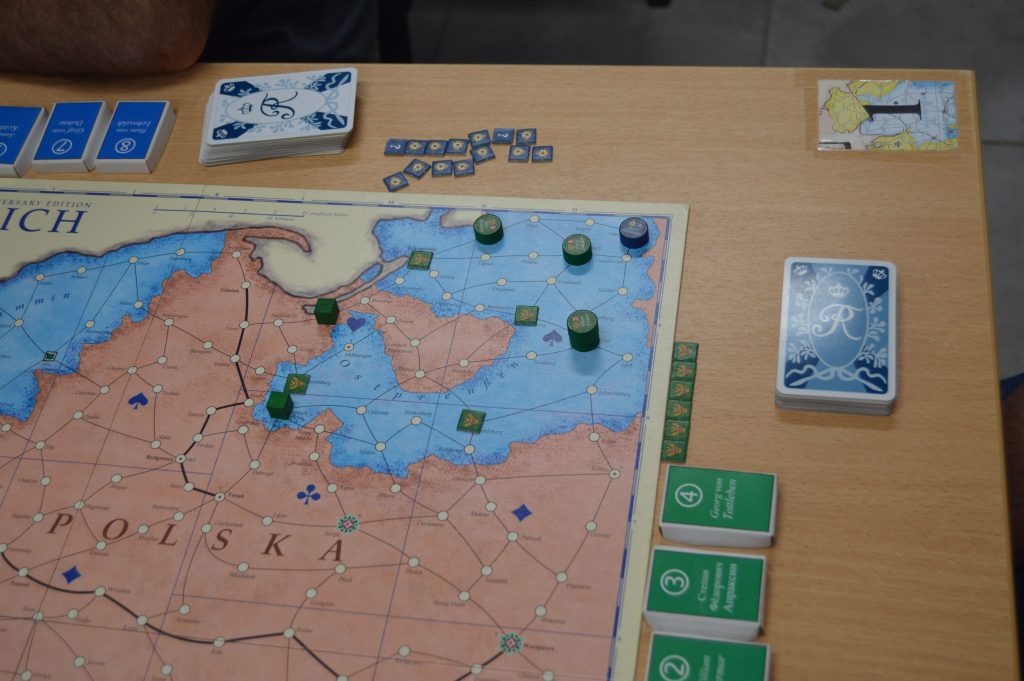
A cunning plan in action. 100% success rate assured!
Table 1
During this last round of the qualifiers, my attention was drawn to this table and newbie out of contest player Juanjo’s novel Russian strategy which could be called “Everything for East Prussia”, as all four Russian generals and their supply trains were dedicated exclusively to the conquest of East Prussia and the destruction of Lehwaldt (P8). The other Allies (Andreas with Austria and Javier with France) felt that Russia was making Prussia’s (Alex Calderón) life easier this way. Shortly thereafter, with E. Prussia cleared and France out of the game (round 11), Juanjo himself realized the potentially fatal drawback to his strategy – that the game might well be over before he even came close to the other Russian objectives.
But nevertheless it worked! Russia stayed in the game long enough for him to wipe out the lone Prussian that an overconfident Alex had sent to stop him and conquer all the remaining objectives by round 18. You may believe Juanjo was just lucky, or is he perhaps a genius in disguise?
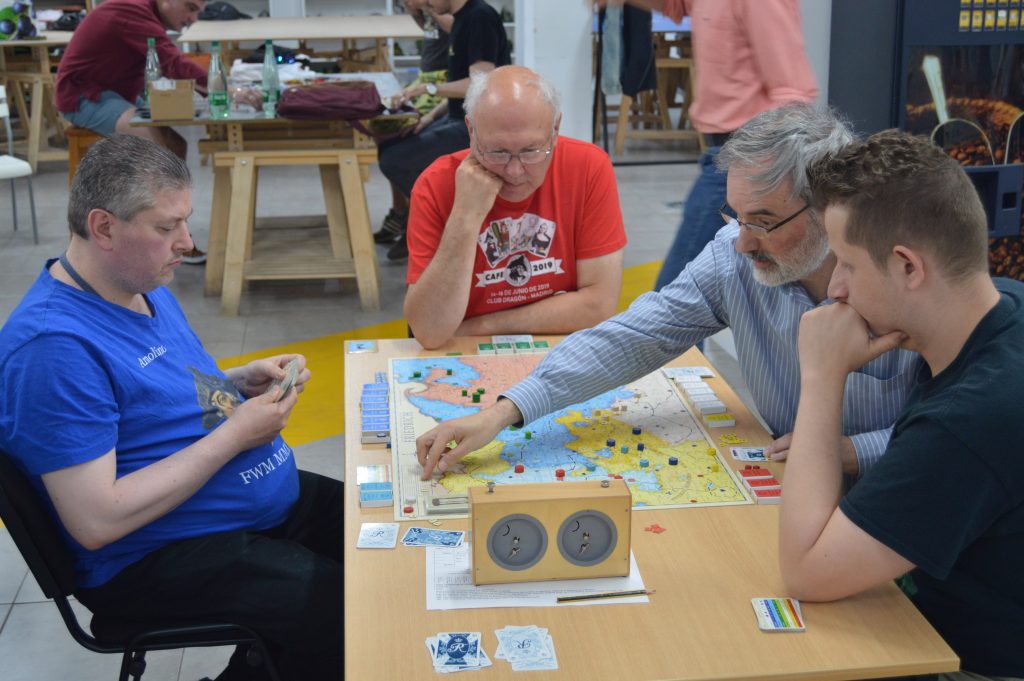
It’s early in the game and José Manuel takes on the duty of removing one of the clock markers, as David Önkür is far too busy calculating his chances to reach the final, and Arnold his chances of winning this game.
Table 2
At the beginning of this round John McCullough (Russia) and David Önkür (France) were respectively 5th and 6th in the rankings, and both had chances to become finalists if they managed to score a win in this game. Unfortunately for them, Arnold led an inspired and aggressive defence that held them off, while José Manuel (Austria) was too busy complaining about the Tactical Cards he got and didn’t make his first attack until round 6 or 7. Unfortunately for Arnold, France and Russia both stayed in the game for very long (Elisabeth lasted until round 18), José Manuel somehow drew the cards he needed, and Prussia’s aggressiveness in the first rounds came to haunt Arnold later on, as he started running short of cards (Lord Bute in round 14) and was running on stopwatch time rather early. After surrendering to José Manuel in round 19, it could be said that Arnold had been 95% successful with Prussia – he would have won just one round later – but 100% successful in dashing John and David’s hopes of reaching the final.
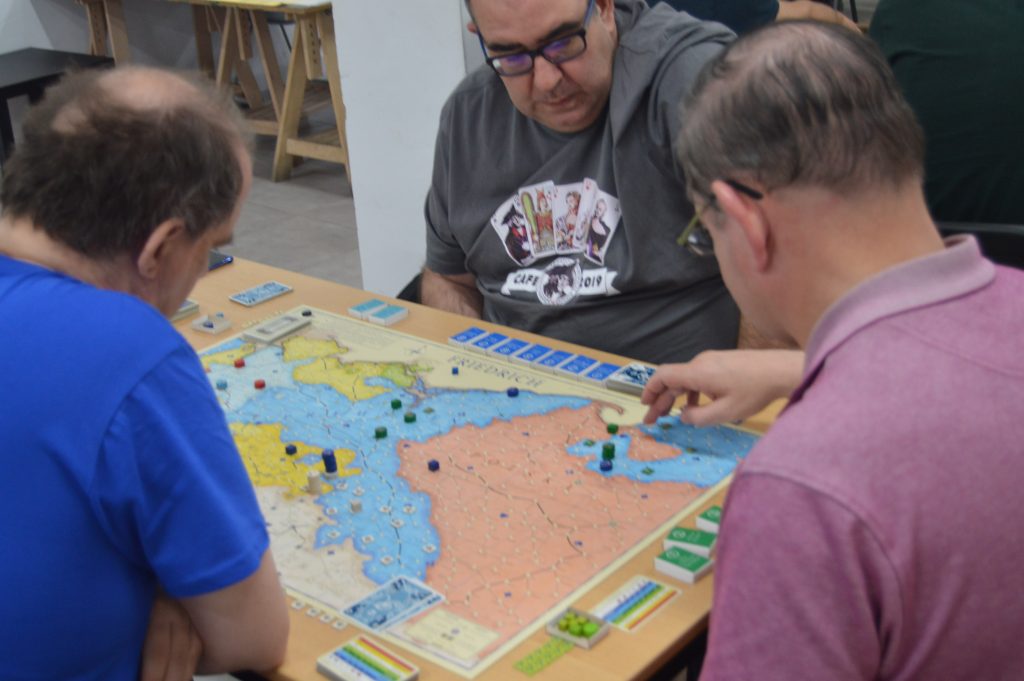
Mark’s Russians are on the move under close scrutiny by Alberto. Note the Prussian triple stack in the middle of the board on the border between Silesia and Saxony embarked upon a risky yet successful gamble.
Table 3
Alberto (Prussia) and Björn (Austria) were already classified as finalists before this game. They both needed just to avoid messing up to score enough points to go through. Prussia quickly abandoned Silesia to its fate and concentrated on Saxony. But the 3-general stack he had there temporarily left the diamond sector around Radeberg and attacked an Austrian general in the neighbouring clubs sector in Silesia, taking an immense risk as he was already fighting in clubs against Russia (Mark) and Björn was able to place a 2-general stack at Bautzen on the diamond-club border, with a good chance of taking his last primary objective unopposed. Fate then intervened by sending Elisabeth to her grave (round 9) which enabled Alberto to attack Bautzen and exchange his clubs for Björn’s diamonds. After the game Alberto confirmed that running this risk had been very necessary, as he was low on diamonds. Things settled down after this intense couple of rounds. Björn wouldn’t recover his lost diamond cards, Mark couldn’t do much harm with Sweden alone, and Juan (France) was held in check by Alberto, who won after 17 rounds, with both him and Björn reaching the final.
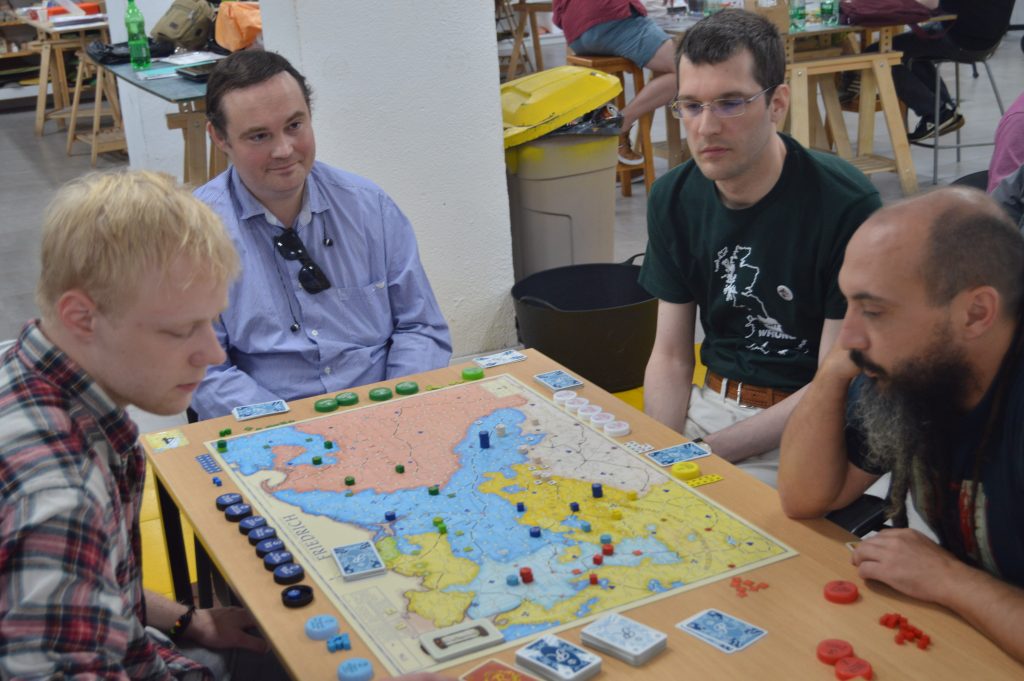
David provides a smile and a cheerful mood to this table during a tense battle between Hanover and France.
Table 4
Taking command of the Prussians in his last game of this tournament, Alexander Schröder decided to concentrate his defence in Silesia, forming an early triple stack there. This decission paid off against Austria (Andrew) as the Empire was left to its own devices and Austria concentrated against Silesia throughout the entire game. Prussia was also helped by the fact that subsidy reductions came rather late – though one after the other; rounds 16 and 17 – and only right after Sweden and Russia had left the game (rounds 14 and 15). Until then, David Fernández was never able to achieve very much with the green pieces, as he was permanently low on clubs. Devoid of any support by any of his allies, Daniel Pastor with the French was happy to hold 8 objectives at end of the game on round 20, with victory going to solid Prussian play.
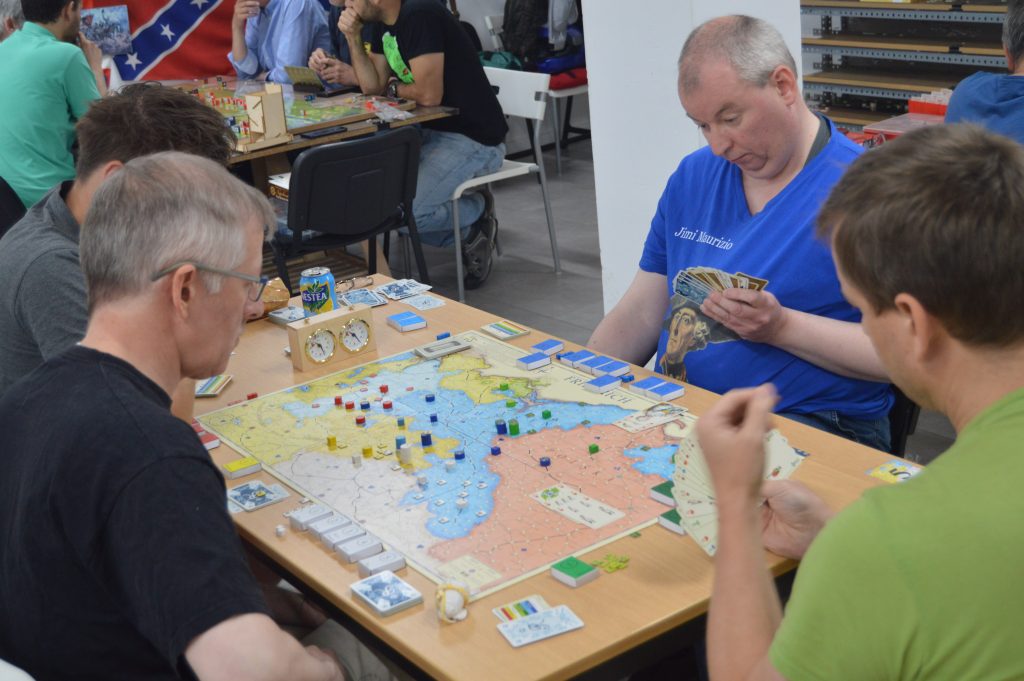
Unknowingly almost as close to victory as he was to defeat, Maurice ponders over his cards about continuing the fight against Russia. Notice the Hanoverians (light blue) in Saxony.
Table 5
If playing with Prussia on Sunday morning with all the accumulated exhaustion of two days of intensive playing wasn’t enough, Maurice had also to deal with two champs as his enemies: Anton as Russia and Guy as Austria. East Prussia was cleared by Anton on round 3-4, and the main defence of Prussia against Russia drifted to the hearts sector around Küstrin, which spelled disaster as further west France’s (Felix Schmücker) last objectives were also defended in that suit, due to the abandonment of the area by Hanover. And right then, Elisabeth died (round 7) and Maurice seemed to have saved the day.
Or not? Silesia was quickly abandoned to Austria for a defence of Saxony, supported by the presence of the Hanoverians there. Unfortunately for Maurice, Guy had a very strong hand in the decisive suit (diamonds) and was able to earn victory in round 9 in spite of the presence of the light blue pieces in Saxony. In that same round Felix made one last attempt to take his last two objectives, but ran out of hearts and failed.
The funny thing is that, according to the distribution of the Cards of Fate, Maurice would have won this game in round 10! Just one more round!


 Español
Español

